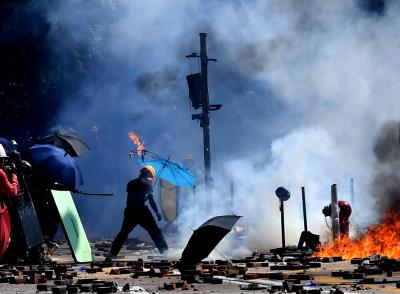Over 30 arrested in HK over security law enactment
By IANS | Published: July 1, 2020 01:02 PM2020-07-01T13:02:05+5:302020-07-01T13:20:07+5:30
Hong Kong, July 1 More than 30 people were arrested on Wednesday after hundred took to the streets ...

Over 30 arrested in HK over security law enactment
Hong Kong, July 1 More than 30 people were arrested on Wednesday after hundred took to the streets of Hong Kong in anger over the enactment of China's national security law on the city as it marked 23 years since its handover from British to Chinese rule.
The activists protested on the first full day of the legislation being in force in Hong Kong, which will target acts of secession, subversion, terrorism and collusion with foreign forces to endanger national security, reports the South China Morning Post (SCMP) newspaper.
In Causeway Bay, police raised a new flag warning crowds they were violating the freshly minted law, but campaigners still gathered in defiance of a ban on the Civil Human Rights Front's annual July 1 march, the first time the application has been rejected.
In Causeway Bay, hundreds of people have gathered in different locations despite police warnings they are taking part in unauthorised assemblies.
Police have used pepper spray on protesters there, and at least two more were receiving treatment from volunteer first-aiders after reportedly being hit.
In Wan Chai, hundreds of protesters were marching towards Admiralty. Some are shouting "Liberate Hong Kong; revolution of our times" and "Hong Kong independence, the only way out".
In Central, no protesters have been spotted yet but there are three police vehicles parked near Landmark mall, and groups of riot police in the area, said the SCMP report.
Meanwhile, the police force said that it has arrested more than 30 people in Causeway Bay on suspicion of violation of the national security law, illegal assembly, and obstructing officers in execution of their duties.
It said on a Facebook post that groups of people have gathered in various locations in Causeway Bay, disturbing public order.
The force said that officers have warned them to leave but many still refuse to do so. The force urged protesters to immediately stop illegal activities.
The full draft of the controversial legislation, in six chapters consisting of 66 articles, was released late Tuesday night after it became effective in the city amid widespread concerns about its implications, despite official reassurances that only a small minority would be targeted, said the South China Morning Post newspaper.
It lists four categories of offences secession, subversion, terrorism, and collusion with a foreign country or external elements to endanger national security.
The maximum penalty for each crime is life imprisonment, although the suggested sentence for some minor offences is less than three years' imprisonment.
Suspects can be extradited to mainland China in cases that involve "complicated situations" of interference by foreign forces; cases in which the local government cannot effectively enforce the law and ones where national security is under "serious and realistic threats".
Moreover, any person convicted under the law will not be allowed to stand as a candidate in the elections for Hong Kong's Legislative Council.
The next elections to elect the members of this body are scheduled in September.
On Tuesday, several pro-democracy groups in Hong Kong announced their dissolution, fearing that the new law would put their members at risk.
The 1984 Sino-British Joint Declaration, which articulated Hong Kong's handover from British to Chinese hands in 1997, established a legally binding treaty whereby Hong Kong's freedoms and autonomy had to be safeguarded for at least 50 years from that date.
The Chinese Ministry of Foreign Affairs has said on numerous occasions that the clauses of the treaty were fulfilled at the time.
( With inputs from IANS )
Open in app